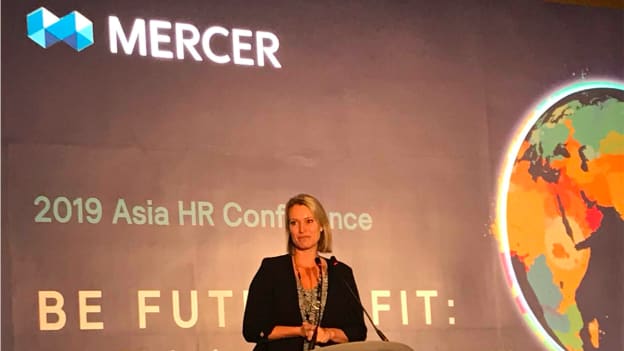We have to start becoming comfortable with being uncomfortable: Peta Latimer, CEO Mercer Singapore

Kickstarting Mercer’s 2019 Asia HR Conference in Singapore on the theme “BE FUTURE-FIT: De-risk, Innovate, Empower”, Peta Latimer, CEO Mercer Singapore, shared that it was a decade ago that she was introduced to the term VUCA. She was thrilled that as leaders and employers, we have the opportunity to influence the future of work- a future where we don’t have to wait for weekends to have dinners with our families; a future where we don’t have financial security lurking at the back of our mind when making decisions. Changing the way work works and making a difference in the lives of others is what motivates her. And this is also what represents the core of the purpose of Mercer: making a difference to its clients, colleagues, and communities in which it operates.
As an organization, Mercer is more than 75 years old and 41 years of that, it has been in Singapore. Throughout this journey, it has seen huge changes. And just as every organization is experiencing transformation, so is Mercer. The firm continues to make big investments and acquisitions across all lines of businesses: Health, Wealth and Career, demonstrating their big bet on remains on people, and the belief that relationships & connections matter. Conferences such as this annual HR event, aim to stimulate thinking, because the smarter our community is, the more we will be able to make a difference in the moments that matter.
These are uncertain times and we have to start being comfortable with being uncomfortable
But it is not just intelligence that matters, averred Peta. It is our responsiveness to change - our resiliency, our adaptability, our ability to get up and try again no matter how tough. It is about pushing ourselves well beyond our comfort zones. For most people, it feels quite turbulent and unsettling. Predicting the future has never been easy, so we have to start becoming comfortable with being uncomfortable. Because disruption real. It is not new but it is simply happening faster than ever before through the exponential explosion of new technologies, to the rise of competitors we never thought possible. It’s up to us to no longer be blindsided by disruption, instead able to respond quickly and efficiently.
A pleasing upside to this somewhat uncertain environment is the findings by Mercer’s 2019 Global Trends Study that this year, three out of four executives are predicting significant disruption to their industries and beginning to think about change. And this is a good thing because awareness of disruption leads to planning, and planning leads to action. The results show that 99% of companies are taking action to get ready for the future of work With so much discussion on topics like automation, job creation, reskilling, and the need for soft-skills, it’s a fantastic time to be in the HR profession. It is no longer about having a seat at the table because the table has come to us.
HR must be thinking future forward
Anyone who has worked in HR and has been involved in cultural transformation knows that changing cultures and people is difficult. Because the norms under which we have been operating have been reinforced over and over again for decades, if not centuries. The need to slow down to go faster has never been more meaningful nor as hard as it is today.
As a CEO, Peta revealed that she gets asked three questions the most- how can one build more agile organizations, how do you develop a growth mindset particularly in leaders, and how can we help people stay relevant? Organizations can provide people the best learning opportunity and training, but it’s ultimately up to individual employees to remain curious and take ownership of their own learning.
In conclusion, Peta remarked that we are right in the age that will be forever defined as the intersection between human and artificial intelligence. As HR practitioners, business leaders and consultants, it is absolutely vital to be thinking future-forward and becoming comfortable with being uncomfortable, if we are to transform ourselves. As HR leaders, that is why we need to think about-de-risking, reinventing the way work works, innovating, and ultimately building an environment that is future-focused, people-oriented and tech-enabled.
(Stay tuned for more updates from Mercer’s 2019 Asia HR Conference. Find out more.)

















